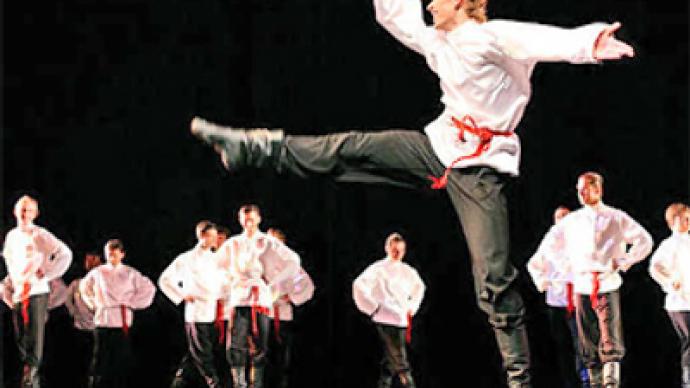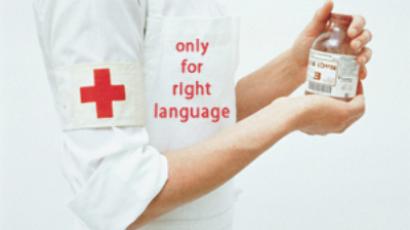Moscow promotes “Russian world” as cultural alternative to McWest

As Russia continues to absorb Western influences, participants at a Moscow forum argue that Russian culture – from language to traditions – needs “endangered species” status.
Across Russia one can easily find the hulking footprint of western culture, which in the majority of cases can be translated to mean “American culture.”
The ubiquitous presence of McDonald’s, Microsoft Windows and Ford Motor Company, for example, combined with the powerful influence of Hollywood, Walt Disney and Bruce Willis, has a subtle way of distorting, some believe, the Russian identity, more popularly described as the inimitable “Russian soul.”
Out of the hostile environment of this existential threat, whether real or imagined, was born the Russian World Foundation (RWF), which is now hosting its third assembly in Moscow.
One of the suggestions forwarded at the assembly was to introduce a new term to denote a community of nations united by Russian culture.
“The term ‘a Russian world country’ could be introduced into usage,” Patriarch Kirill of the Russian Orthodox Church said at the opening of the assembly. “It would mean that a country sees itself as part of the Russian world if it promotes Russian culture, and preserves the general historical memory.”
Kirill made passing reference to “the nations inhabiting the area of historic Rus,” which certainly includes Ukraine, the “historical homeland” of modern-day Russia.
Those nations should “realize their being part of the same civilizational project and come to see the Russian world as their common supranational project,” he said.
Kirill’s proposal is an effort to forge a new global identity to offset the preponderant and not always innocuous influence of “The West,” a generic term that has come to define all of those cultural traits, products and influences that are not inherently Russian by nature. In other words, the creation of a new culture alternative – "Russian World" – for those who have become jaded with the rampant materialism and spiritual emptiness of the western option. After all, as one participant said, "democracy is all about choices."
“We need to continue to be aware of the uniqueness of the Russian way of living,” Kirill continued, “and reproduce it not only in the countries with a predominantly Russian culture, but also attest to it far beyond our boundaries.”
Under no un-Cyrillic terms
In order for a Russian World alternative to be able to take root on sometimes undernourished soil, the Russian language needs to be nurtured abroad.
Russian Deputy Foreign Minister Alexander Yakovenko emphasized the need to give the Russian language “second-language status” in the former Soviet republics.
“The Russian language as a unique instrument of international communication, is constantly growing,” Yakovenko told the participants. “It is the fifth largest language in the world – Russian is the native language for 160 million people, and over 300 million people understand it.”
“Over 160 peoples and nationalities communicate in Russian,” the deputy foreign minister reminded the guests. “It is one of the main languages of the United Nations system and other international organizations.”
Yakovenko then mentioned the many institutions working abroad to help cultivate the Russian language abroad.
“Fifty-two Russian centers of science and culture, and 26 missions of “Russotrudnichestvo” (the federal Agency for the Affairs of the CIS, Ethnic Russians Abroad, and International Humanitarian Cooperation), operating in 72 countries, work to spread the Russian language,” he said.
“The signing of intergovernmental agreements to establish centers in Belarus, Kyrgyzstan, Tajikistan, Turkmenistan and China is due shortly,” Yakovenko added. “We plan to open before the year 2020 over 30 centers and affiliates of already existing Russian centers of science and culture in major cities of CIS and Baltic states, as well as nations of Europe, America, Asia and Africa.”
Why a “Russian World?”
Vyacheslav Nikonov, the executive director of Russian World Foundation (RWF), said that part of the mission statement of the increasingly vigilant organization is “representing the Russian world.”
“Our goal is to support the Russian language, Russian culture, and organizations representing the Russian world,” Vyacheslav told The Moscow News weekly in a past interview . “We will work directly with Russian organizations based outside Russia.”
Nikonov’s comments reflect the mood now prevalent in the Kremlin, which seems to have lost its patience with the rise of “anti-Russian” sentiment in its backyard and beyond.
In perhaps the greatest manifestation of this national awakening, Russian President Dmitry Medvedev stunned Ukraine in August, accusing the capital of Kiev of propagating anti-Russian views and even glorifying “Nazi associates.”
“The problems in our bilateral cooperation existed before, of course,” Medvedev said in the letter, addressed to Ukrainian President Viktor Yushchenko. “It was natural after the collapse of the Soviet Union… however, the events that we have been witnessing during your presidency cannot be considered anything else but Ukraine’s deviation from the principles of friendship and partnership with Russia.”
Then the Russian president dropped the diplomatic equivalent of an atom bomb by informing Kiev that he was withholding the Russian ambassador until further notice.
“I want to inform you that under the current anti-Russian course,” Medvedev said, “I have taken a decision to postpone sending a new ambassador to Kiev.”
Some commentators point to Kiev’s less-than-gracious welcoming of Russian Patriarch Kirill during his 10-day visit to Ukraine in July-August as the spark that ignited Medvedev’s strongly worded letter to Yushchenko.
At the end of July, Patriarch Kirill, head of the powerful Russian Orthodox Church, began his turbulent whirlwind tour of Ukraine, where he beseeched Ukrainians to remain faithful to the “one true church.” But Yushchenko said Ukraine was searching for an independent church of its own, i.e. beyond the influence of Moscow.
“This church already exists,” snapped back Kirill. “It is the local church of Ukraine, and if it did not exist, Ukraine would not exist today."
The Patriarch went on to describe Kiev as the “southern capital of Russian Orthodoxy,” and said that Ukraine’s attempts at breaking away represented “wounds” on the body of the Russian Orthodox Church.
Orthodox Christianity, which came into existence following the Great Schism with Rome in 1054, is the dominant religion in Ukraine.
Following the collapse of the Soviet Union in 1991, splinter churches broke off from the body of the Russian Orthodox Church and it is the Moscow Patriarch’s holy ambition to heal this rift before it gets any worse.
The Orthodox Church's efforts are bearing fruit in other parts of the world. In 2007, for example, the Moscow church celebrated it reunification with the U.S.-based Russian Orthodox Church Abroad, whose original founders fled Bolshevik Russia in 1917.
“Russian World” movement works in extreme conditions
Against the backdrop of the Russian World Foundation assembly is the Day of National Unity, which will see nationalists march in Russian cities on November 4, a Russian public holiday.
Alexander Belov, one of the organizers of the Movement Against Illegal Immigration, said 5,000 people are expected to turn out for the marches, although “we only have a permit for 2,000” he added, according to Interfax.
Marches have been permitted in 16 Russian cities, including Moscow, Krasnoyarsk, Vladivostok, Irkutsk, Volgograd, Kirov and Nizhny Novgorod.
Meanwhile, Russia registered 266 extremism-related crimes in January-September, up 6 percent as against the same period last year, said Vyacheslav Sizov, who heads the department on combating extremism at the General Prosecutor’s Office.
“Unfortunately, the number of extremism-related crimes really grows every year,” he said in an interview with the Moskovsky Komsomolets daily on Tuesday.
“The survey of criminal cases proves that one of the major reasons that causes crimes is the spread of ideas of religious, ethnic and racial supremacy among underage persons and youth,” Sizov said.
It is in this occasionally hostile world, aggravated as it is by the financial crisis, that the Russian World Foundation must work.
“It’s a very promising venture,” one guest participant of the forum commented. “But we must move forward with care and sensitivity not to aggravate the negative ideals of nationalism in immature minds.”













